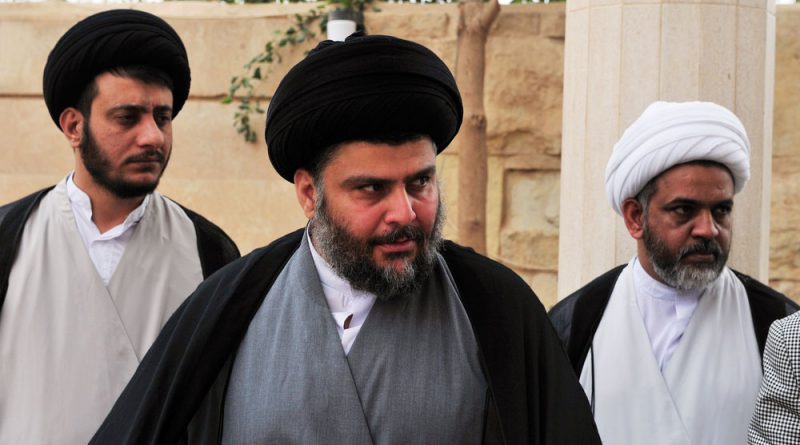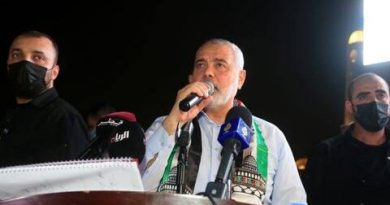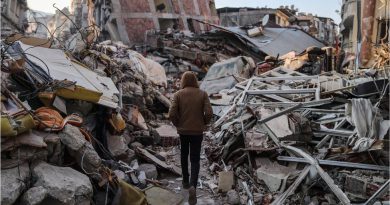OPINION: After Sadr’s move, who will rule in Iraq, ballots or bullets?
Sadr is becoming more popular, engaging with the people more, and solidifying his grass-roots movement.
Shiite cleric Moqtada al-Sadr announced he was bowing out of the political process in Iraq, throwing the whole political landscape into the unknown. The decision came following the Iraqi parliament speaker Mohammed al-Halbousi’s approval of the Sadrist bloc lawmakers’ resignation though they captured the biggest number of seats in the election held in October 2021. Sadr’s move comes amid an atmosphere of polarization. The country is sharply divided between two camps. A camp, led by Sadr, wants Iraq independent and free of any foreign intervention. The other camp, meanwhile, wants Iraq to remain and Iranian satellite state and backyard, with militias going on rampage throughout the country and flexing political and military muscles in the face of foes.
The Coordination Framework, the alliance that encompasses the pro-Iran Shiite political forces, have been pushing back against Sadr, blocking the parliamentary vote to elect the president of the republic.
In the Iraqi political process, deadlock is common. Consensus is difficult and rare to achieve between political forces whose patrons have opposing agendas—and militants on the ground.
Not a spur-of-the-moment move
The period following the election was fraught with talks, tensions, threats and impasses. There have been attempts by Sadr to forge consensus and form a national majority government. But all the efforts came to naught.
In the beginning, Sadr held meetings with the Kurdistan Democratic Party (KDP) and Taqadum alliance led by Mohammed al-Halbousi. In March, Sadr announced that he will give an opportunity to the Coordination Framework to form a government within forty days in consultation with the other political forces. But they have failed. Sadr then called on the independent lawmakers to join the Sadrist bloc to form an independent government within 15 days, which was another failed attempt. Therefore, in mid-May 2022, Sadr announced the deliberations on forming the government had failed, announcing he would shift to the ranks of the opposition.
“I was honored that affiliates of my movement constitute the biggest bloc in the history of Iraqi parliament. I was honored to form the biggest cross-sectarian-quota bloc. I was honored to depend on myself and not to be a pawn to outside entities. And I was honored to refrain from resorting to the judiciary to advance the needs of the people and demands of forming the government”, Sadr wrote on Twitter.
Sadr also noted the growing convergence of enemies against him both at home and abroad, as well as the failure of his efforts to form a national majority government.
“But we now have a single remaining option that we should try, which is joining the ranks of the national opposition for thirty days. If the parliamentary blocs, including those with whom we were honored to forge alliances, succeed in forming a government that ease the suffering of the people, then it’s okay no problem. Otherwise we will take other steps which we will announce when appropriate”, Sadr noted in his Twitter post.
Sadrist growth vs. Iranian decline
Over the years, the Sadrist movement has been growing stronger on the Iraqi landscape, attracting more supporters and voters among the Iraqis. The movement set off the journey on the Iraqi landscape through militancy, leading cutthroat resistance against the US forces in the country via the Mahdi Army. Then things began to change, with Sadr becoming more nationalist-oriented, moderate Shiite and rational politician. He engaged in the political process, toned down rhetoric and began capturing seats in parliament.
A quick comparison of the 2018 Iraqi parliamentary election results with the 2021 election results is illuminating. Sadr’s Sairoon bloc won 54 seats in 2018, while the pro-Iran Fatah Alliance led by Hadi al-Ameri and the State of Law Coalition led by former Prime Minister Nouri Al-Maliki won 73. In 2021, Sadr captured 73 seats, which was equal to the number of seats captured by both pro-Iran alliances combined in 2018, while these factions, coalescing around Coordination Framework, captured 51 seats, which was less than what Sadr captured alone in the 2018 election.
This abrupt shift in Sadr’s favor is not without reason. Sadr is becoming more popular, engaging with the people more, and solidifying his grass-roots movement. He is pursuing a nationalist, inward-looking agenda, in contrast to the extraterritorial, transnational agenda embraced by Iran-backed forces in the country. On the other hand, pro-Iran forces are becoming increasingly bankrupt. They have nothing to offer the Iraqis. Decades of corrupt rule, kleptocracy, sectarianism, and complacency in the face of terrorism have left Iraqis in shambles. The oil-rich country is teeming with poor, destitute, and displaced people who have experienced the horrors of terrorism at the hands of both Sunni and Shiite militants.
Iran, the patron of Shia parties that have ruled Iraq since 2003 and their affiliated Shiite militias, is also in trouble. Qassem Soleimani, the architect of Iran’s extraterritorial military missions, has died. Sadr’s mission is made easier by Esmail Ghaani’s poor performance as his successor. Furthermore, the regime is beset by a slew of internal issues, including mounting popular outrage over deteriorating economic conditions and the draconian religious dictatorship.
Hence, there’s a Sadrist ascendancy fueled by the domestic grievances experienced by the Iraqis, the rational rhetoric addressing the people’s very needs and interests while the pro-Iran club is facing incessant losses.
The ballots versus the bullets
Politics in Iraq has been governed by weapons and bullets rather than people and ballots for decades. In broad daylight, all political actors have militiamen taking up arms on the streets, flexing their muscles in the face of the weak state apparatuses. The pro-Iran factions have one ace up their sleeves: the 160,000 militiamen operating under the banner of the Popular Mobilization Forces (PMF). Some argue that the current battle in Iraq is one of ballots versus bullets.
Hence, we have two chief camps: The Sadrists who enjoy the people’s support and confidence, which translated into more votes and more seats in parliament and the pro-Iran alliance who have the weapons and indoctrinated militiamen not even believing in nation-state.
The post-2003 political system appears to be dysfunctional. Sadr wants to shake things up, if not blow them up. Sadr is expanding the role of the people by appealing to larger segments of them and including them in his grassroots movement, thereby reducing the share of pro-Iran factions who play politics through military force. Sadr is currently the only hope that the ballots will triumph over the bullets one day, hopefully soon.
Mostapha Hassan Abdelwahab is the former editorial manager of the English edition of the Baghdad Post. He is focusing on Iraqi and Iranian affairs, with articles posted on the Herald Report, Vocal Europe and other platforms.
Disclaimer: Views expressed by writers in this section are their own and do not reflect Milli Chronicle’s point-of-view.



